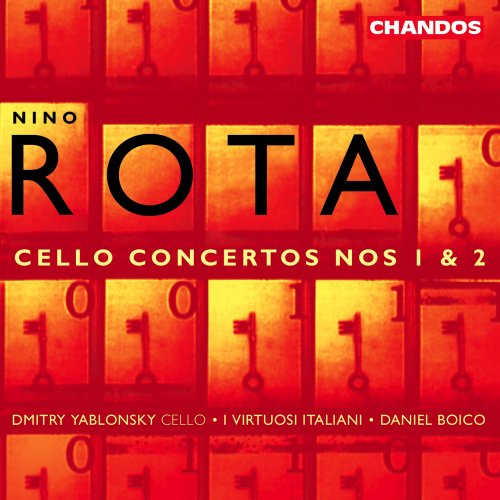
Dmitry Yablonsky, Daniel Boico, I Virtuosi Italiani - Rota: Cello Concertos Nos. 1 & 2 (2001) Hi-Res
BAND/ARTIST: Dmitry Yablonsky, Daniel Boico, I Virtuosi Italiani
- Title: Rota: Cello Concertos Nos. 1 & 2
- Year Of Release: 2001
- Label: Chandos
- Genre: Classical
- Quality: FLAC 24bit-44.1kHz / FLAC (tracks)
- Total Time: 49:59
- Total Size: 470 / 196 Mb
- WebSite: Album Preview
Tracklist:
Concerto For Cello And Orchestra No. 1 (25:39)
1. Allegro 10:14
2. Larghetto Cantabile 7:53
3. Allegro 7:27
Concerto For Cello And Orchestra No. 2 (24:18)
4. Allegro Moderato 6:25
5. Tema E Variazioni. Andante Cantabile Con Grazia 13:57
6. Allegro Vivo 3:50
Performers:
Dmitry Yablonsky (cello)
I Virtuosi Italiani
Daniel Boico
Concerto For Cello And Orchestra No. 1 (25:39)
1. Allegro 10:14
2. Larghetto Cantabile 7:53
3. Allegro 7:27
Concerto For Cello And Orchestra No. 2 (24:18)
4. Allegro Moderato 6:25
5. Tema E Variazioni. Andante Cantabile Con Grazia 13:57
6. Allegro Vivo 3:50
Performers:
Dmitry Yablonsky (cello)
I Virtuosi Italiani
Daniel Boico
These two concertos come from late in Nino Rota's career, coming in-fact just when he was finding his greatest fame as the composer of The Godfather Trilogy.
(1972). The first concerto dates from that same year, the second from the year after. Consequently there are more similarities than differences. Both are in three movements, each opening and closing with an allegro, and each playing for approximately 25 minutes. Indeed, by current, and certainly by Chandos standards, this is a short release for a classical album. There is an undeniable completeness and symmetry to simply providing the two concertos, but at full price another work in the 15-25 minute region would not have gone amiss. Rota did after all pen something in the region of 150 classical scores, the vast majority of which remain unrecorded.
The music itself falls squarely within the classical romantic idiom which found Rota ignored or derided by the critical musical establishment. It was though, the music of a true radical, which is to say a man who followed his own course, rather than the fashionable 'radicalism' - actually a conformity to the avant garde dictates of the musical intelligentsia - to the detriment, at least in fashionable circles, of his career. As he wrote, "I believe that the 'untimeliness' currently perceived in my work may be an assurance that in the future it will be perceived as timely." He was right, and that time is now, the modish experimental, theoretical noise which passed for serious music in the 50's and '60's now largely consigned to ivory towers and the rubbish heap of history.
Rota's music meanwhile lives on, and though not always of the highest order, is suffused with a very human warmth of feeling, and shot through with melodic ideas, such that it is music to be enjoyed to normal human beings first, dissected by academics second. Coupled with an elegant neo-classical sensibility these two concertos are accessible, at times exciting, yet ultimately not very substantive nor among the composer's finest offerings. Enjoyable, yet not really music to be revived too often, the performances are nevertheless first-rate and the rich Chandos sound as fine as ever. Film music buffs with a taste for the Golden Age style of scoring and Rota aficionados alike need have few reservations about adding this disc to their collections. Others may like to try to get a listen first. -- Gary S. Dalkin
(1972). The first concerto dates from that same year, the second from the year after. Consequently there are more similarities than differences. Both are in three movements, each opening and closing with an allegro, and each playing for approximately 25 minutes. Indeed, by current, and certainly by Chandos standards, this is a short release for a classical album. There is an undeniable completeness and symmetry to simply providing the two concertos, but at full price another work in the 15-25 minute region would not have gone amiss. Rota did after all pen something in the region of 150 classical scores, the vast majority of which remain unrecorded.
The music itself falls squarely within the classical romantic idiom which found Rota ignored or derided by the critical musical establishment. It was though, the music of a true radical, which is to say a man who followed his own course, rather than the fashionable 'radicalism' - actually a conformity to the avant garde dictates of the musical intelligentsia - to the detriment, at least in fashionable circles, of his career. As he wrote, "I believe that the 'untimeliness' currently perceived in my work may be an assurance that in the future it will be perceived as timely." He was right, and that time is now, the modish experimental, theoretical noise which passed for serious music in the 50's and '60's now largely consigned to ivory towers and the rubbish heap of history.
Rota's music meanwhile lives on, and though not always of the highest order, is suffused with a very human warmth of feeling, and shot through with melodic ideas, such that it is music to be enjoyed to normal human beings first, dissected by academics second. Coupled with an elegant neo-classical sensibility these two concertos are accessible, at times exciting, yet ultimately not very substantive nor among the composer's finest offerings. Enjoyable, yet not really music to be revived too often, the performances are nevertheless first-rate and the rich Chandos sound as fine as ever. Film music buffs with a taste for the Golden Age style of scoring and Rota aficionados alike need have few reservations about adding this disc to their collections. Others may like to try to get a listen first. -- Gary S. Dalkin
Classical | FLAC / APE | HD & Vinyl
As a ISRA.CLOUD's PREMIUM member you will have the following benefits:
- Unlimited high speed downloads
- Download directly without waiting time
- Unlimited parallel downloads
- Support for download accelerators
- No advertising
- Resume broken downloads


